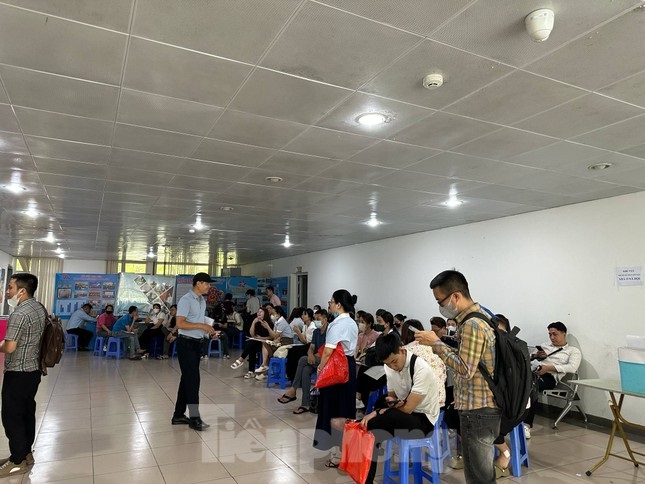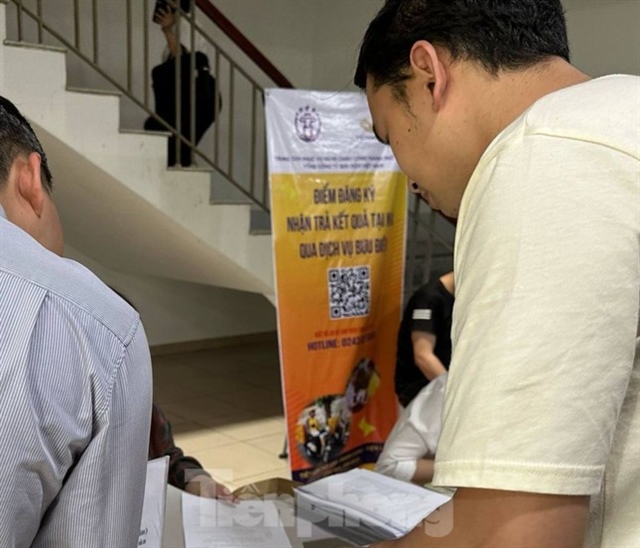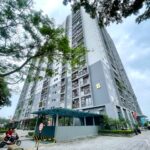The Challenges of Navigating the Home-Buying Process
Ms. Nguyen Kim from Thanh Xuan, Hanoi, shared her experience: “Two years ago, I attempted to purchase a social housing unit at the Trung Van project in Nam Tu Liem, Hanoi, but was unable to due to a requirement that only those with a Hanoi household registration were eligible. Now, I’ve learned of an upcoming project in Long Bien that doesn’t have this restriction, so I’ve decided to try again.”
 Crowds of people queue up to submit their applications for housing confirmation at the Long Bien Land Registration Office (Photo: Ngoc Mai)
|
Ms. Kim continued, “After two visits to the Long Bien Land Registration Office, spaced 20 days apart, I was able to submit my application for confirmation of not owning a house in Hanoi. Each time, hundreds of people were waiting to submit their applications. According to the queue, I was nearly 2,000th in line, and I had to wait until the end of June to receive my confirmation,” she said.
This confirmation is just one of the requirements for purchasing social housing. In addition, Ms. Kim also had to provide confirmation of her eligibility and income.
“I thought the housing confirmation was the most challenging part, but verifying my income as a freelance worker proved even more difficult because no one was willing to provide confirmation,” Ms. Kim shared.
According to Decree No. 100/2024/ND-CP, individuals wishing to purchase social housing must meet the requirements of not owning a house in the project area and having a household income of no more than VND 30 million/month. However, the income verification process has become a significant obstacle, especially for freelance workers.
In reality, not only do individuals face challenges, but local authorities responsible for evaluating and confirming applications also encounter numerous difficulties.
A leader from Thuong Thanh Ward, Long Bien District, Hanoi, shared that there are several social housing projects in the ward accepting applications. Many residents have come to the People’s Committee to request confirmation of low income. However, up to now, the ward has not been able to process these confirmation requests due to a lack of basis for confirmation.

People waiting to submit their social housing applications (Photo: Ngoc Mai) |
Especially for freelance workers, the verification process is even more challenging because they do not declare personal income tax and do not participate in insurance, leaving the ward without a basis for confirmation.
Many people feel lost in the maze of paperwork and turn to “middlemen” offering to handle the applications for a fee.
Ms. Nguyen Thu from Hoang Mai, Hanoi, spent VND 18 million on a “middleman” to process her application. “I had no idea how to start the process for social housing, so when I saw people offering their services on social media, I agreed to pay,” she said.
When contacted via phone numbers listed on social media, these brokers carefully inquire about income and whether the applicant has an employment contract. Even if the necessary documents are not available, they still offer to create a “complete and beautiful” application for a fee ranging from VND 10 million to VND 20 million.
Although the Hanoi Construction Department has not announced the receipt of applications from project investors, these brokers set their own deadlines. They also require immediate payment for their services.
According to a representative of BIC Vietnam, the investor of the Long Bien social housing project, the company has publicly posted instructions for applicants on its website, but many people still go through “middlemen” and end up paying unnecessary fees.
A representative of UDIC, the investor of the Ha Dinh social housing project, also warned potential buyers to be cautious of unofficial information.
If buyers have questions, they should seek information directly from the investors or state management agencies. They should refrain from relying solely on information from a single source or real estate floor.
Income Regulation Inconsistencies
Mr. Nguyen Long from Cau Giay, Hanoi, and his wife have a combined income of VND 31 million/month. This income exceeds the eligibility requirement for social housing. However, Mr. Long shared, “My wife and I still rent an apartment, and our family expenses, including those for our child, take up most of our income. With this salary, I am subject to personal income tax, although it is a small amount. As a result, I no longer qualify to purchase social housing under the current regulations. However, with this income, I also cannot afford to buy commercial housing at higher prices. Consequently, our chances of owning a home are diminishing as we age or face unforeseen circumstances such as illness.”
For many workers, owning a social housing unit in Hanoi is out of reach. While the selling price of social housing in Hanoi has nearly doubled in five years, the eligibility criteria have become outdated. For example, the income limit has remained at VND 10-15 million/m2, while the price of used houses has increased to VND 60-65 million/m2.
Meanwhile, the definition of “low-income individuals” in major cities, with a threshold of VND 30 million for a family, is outdated and unrealistic.
Additionally, the complex paperwork makes it challenging for workers to access social housing. On the other hand, those with higher incomes and better financial capabilities do not meet the eligibility criteria for social housing.
Currently, four social housing projects have been initiated in Hanoi, including the Thuong Thanh project in Long Bien, the Nguyen Xien project in Thanh Tri, and two projects in Dong Anh. These projects are expected to be launched this year. However, the upcoming social housing supply will only meet 20% of the demand in Hanoi.
Ngoc Mai
– 16:30 27/05/2025
Win a Mazda at the CentreVille Luong Son Grand Opening and Customer Appreciation Event
To express our heartfelt gratitude to our valued investors in the CentreVille Luong Son project, we are thrilled to announce that the project developer will be hosting a special event on May 31, 2025. This event will not only offer an exclusive opportunity to purchase units in the project but also present a chance to win exciting prizes, including a grand prize of a Mazda 6 Signature car. Join us at the CentreVille Luong Son urban area in Hoa Binh to be a part of this extraordinary occasion.
When Will Construction Begin on Hanoi’s Trần Hưng Đạo and Ngọc Hồi Bridges?
The plans to construct two new bridges over the Hong (Red) River in Hanoi, Vietnam, are well underway. With preparations almost complete, the investment plans for Tran Hung Dao Bridge and Ngoc Hoi Bridge are set to move forward, with construction commencing on either August 19th or, at the latest, September 2nd of this year. These two bridges will be part of a larger project, consisting of six bridges in total, spanning the majestic Hong River.
Unveiling Hanoi’s Vision: A Myriad of Residential Projects and Urban Developments in Thanh Tri District
The Hanoi People’s Committee has given the green light to 27 new projects in Thanh Tri district, with a key focus on residential and urban development. Among these projects are the new C3-1 urban area in Dai Ang commune, a modern urban area in Lien Ninh commune, and the Tan Trieu social housing complex. These developments are set to transform the region, offering a host of new opportunities and an enhanced standard of living for its residents.
No Land Taxes When Selling Social Housing After 5 Years of Ownership: A Boon for Residents
After August 1, 2024, once the full payment for the house has been made and the red book is obtained, social housing can be sold after a period of 5 years without having to pay land use fees, but income tax and other charges as stipulated by the law must be paid.





















